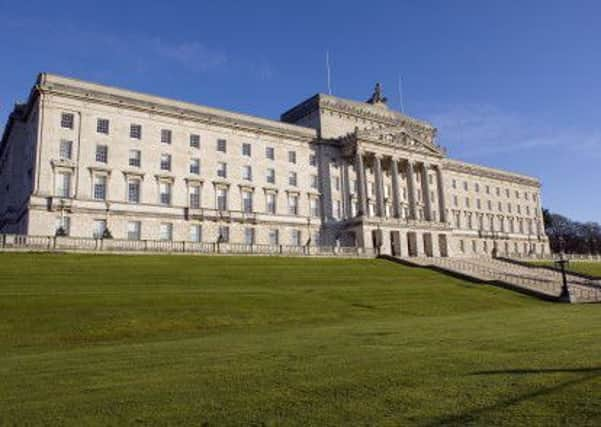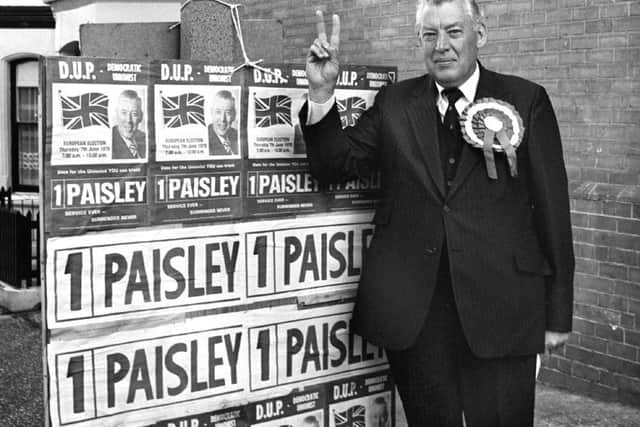Sam McBride: At an unprepared Stormont, all is changed utterly


In a sermon at his Martyrs’ Memorial Church, the DUP founder asked his congregation: “What holds the Common Market together?” He immediately answered his own question: “Satanic power.”
Although many in today’s DUP couch their opposition to the EU in purely secular terms, it was striking that at the Belfast count on Thursday, the jubilant DUP supporters were those with links to Dr Paisley, such as Sammy Wilson, Nigel Dodds and Edwin Poots, rather than former Ulster Unionists such as Simon Hamilton or Peter Weir who represent the ‘new DUP’.
Advertisement
Hide AdAdvertisement
Hide AdWhen Dr Paisley was first elected to the European Parliament in 1979 where he viewed himself as being “among a lot of frog-eaters and snail-mongers”, Dr Paisley famously pledged to “milk the EEC cow dry before slitting its throat”.


And yet, while a large part of the DUP is overjoyed at the outcome of that throat-slitting, as delivered by British voters on Thursday, a consequence has been to destabilise the UK to an extent which will alarm many unionists in Northern Ireland.
In many ways, two of the founding principles of what is now Northern Ireland’s dominant unionist party - staunch unionism and vehement Euroscepticism - came into some conflict in this plebiscite.
Even if the new DUP leader Arlene Foster was far less committed to leaving the EU than the party’s founder, she had limited room for manoeuvre in setting the policy of a party for which this was not a policy, but a founding principle.
Advertisement
Hide AdAdvertisement
Hide AdBy contrast, Sinn Fein - which in the 1975 referendum was campaigning on the same side as Dr Paisley against the European project - this time with ease put itself on the Remain side, but found some of its supporters difficult to convince.


Having won the EU argument in Northern Ireland but lost it across the UK, Gerry Adams yesterday lost no time in demanding a referendum on Northern Ireland’s position within the United Kingdom.
But the extraordinarily low turnout in nationalist areas across the Province has blunted that republican demand.
The spectre of affluent unionist North Down - traditionally the lowest turnout in Northern Ireland - having a higher turnout than the border constituencies of Foyle and West Tyrone indicated that the fearful warnings about the return of a hard border simply did not resonate with sufficient numbers of nationalist voters most directly affected.
Advertisement
Hide AdAdvertisement
Hide AdEven more starkly, turnout actually fell from last month’s Assembly election in Sinn Fein’s West Belfast citadel, where not even half of eligible voters came to polling stations.
Although Northern Ireland voted Remain, the result was far closer than either side expected and the apparent apathy among many nationalists makes it difficult for Sinn Fein to sustain its argument that this is an issue about which they care passionately.
By contrast, the situation in Scotland looks more immediately threatening to the Union. But although there is no reason to believe that Sinn Fein could even come close to winning a border poll if the Government did agree to a referendum, the shock of Thursday’s extraordinary result provides the most fertile ground in years for republicans to cultivate.
But to do so will be difficult if the party maintains its ‘make Stormont work’ stance with the DUP.
Advertisement
Hide AdAdvertisement
Hide AdAt Stormont, after indications in recent weeks that the DUP and Sinn Fein were preparing to work closer together than ever before and the prospect of three stable years without an election, the Executive now finds itself dramatically unprepared for what has happened.
The Executive has seemingly conducted little contingency planning, such was its expectation of a Remain victory. The economist Richard Ramsey yesterday said that it was “game over” for the Executive’s key policy of slashing corporation tax in 2018.
In one day, all is changed, changed utterly.